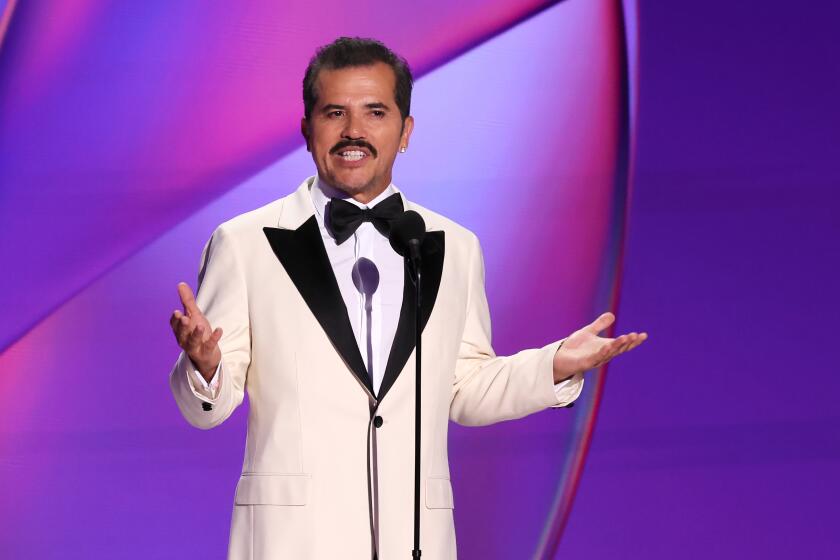Commentary: From ‘Chernobyl’ to ‘When They See Us,’ how best limited series became the Emmys’ strongest category
A decade ago, the miniseries couldn’t get any respect. In 2009 and 2010, as shows like “Mad Men” and “Breaking Bad” were racking up Emmys, the format was so out of fashion that the Television Academy could find only two programs worth nominating for outstanding miniseries. For the next three years, miniseries and TV movies were combined into a single category: The format, which had thrived in the ‘70s and ‘80s when huge audiences tuned in to watch event television like “Roots” and “The Thorn Birds,” was on life support.
How things have changed.
As Tuesday’s Emmy nominations revealed, the once-neglected miniseries — which returned to its own category in 2014 and has been rebranded as “the limited series” — is increasingly at the center of the cultural conversation, eclipsing the drama series in buzz and acclaim.
The nominees include many of the year’s most-talked about series: “Chernobyl,” a harrowing docudrama about the 1986 nuclear disaster that became a surprise hit this spring; “When They See Us” (Netflix), Ava DuVernay’s searing account of the Central Park Five case; “Escape at Dannemora,” a chronicle of the events leading up to a notorious prison break in upstate New York in 2015; “Fosse/Verdon,” an examination of the complicated relationship between director Bob Fosse and collaborator-muse-wife Gwen Verdon; and “Sharp Objects” (HBO), a Southern Gothic tale about a troubled reporter investigating a murder in her small Missouri hometown.
This year’s field was so strong that several worthy contenders — virtual shoo-ins in any other year — didn’t make the cut, including “A Very English Scandal” (Amazon), with Hugh Grant as a closeted member of Parliament; a nonmusical “Masterpiece” version of “Les Miserables” (PBS); and an adaptation of “Catch-22” starring some guy named George Clooney (Hulu).
By comparison, the drama field feels less competitive. Yes, the final season of “Game of Thrones” generated a lot of chatter, but not necessarily for the right reasons. “This Is Us” (NBC) has faded from its first-season highs. Freshman shows “Pose” (FX), set in New York’s ballroom scene of the late 1980s and early 1990s, and “Succession” (HBO), a scathingly funny drama about a media dynasty, are still building word of mouth. “Ozark” (Netflix) feels like too many shows that came before it to be that exciting.
Several of the nominees benefited from timing: Four of last year’s nominees (“Stranger Things,” “The Crown,” “The Handmaid’s Tale” and “Westworld”) were ineligible this time around, and a fifth, “The Americans,” is no longer on the air, leaving room for more under-the-radar shows.
But the buzz around this year’s batch of limited series nominees is also indicative of broader industry trends, starting with the migration of A-list talent to the small screen. Ever since the first season of “True Detective” helped ignite the McConaissance, big-name talent on both sides of the camera have turned to television — the miniseries in particular — for roles that are increasingly hard to find at the movies.
The limited series is particularly appealing to actors who may be wary of signing on to play a role indefinitely. This year’s limited series acting nominees include such Oscar-winning heavy-hitters as Sam Rockwell (“Fosse/Verdon”), Patricia Arquette (“Escape at Dannemora”) and Mahershala Ali (“True Detective”). Amy Adams was also nominated for her performance in “Sharp Objects,” her first TV project.
A number of renowned filmmakers have also flocked to television to direct limited series, which provide a bigger canvas than a two-hour feature. In turn, they lend aesthetic cohesion to these shows. Four of this year’s limited series nominees are directed by a single person: “Escape at Dannemora” (Ben Stiller); “When They See Us” (Ava DuVernay); “Chernobyl” (Johan Renck); and “Sharp Objects” (Jean-Marc Vallée). While this trend has its complications, as the recent flap over “Big Little Lies” indicates, it has undoubtedly helped inject new life into the medium.
Following the success of “The People v. O.J. Simpson” in 2016, the limited series has become TV’s favorite way of exploring the past in a new light. Several of this year’s nominees are based on true stories from recent history that have powerful resonance in the present day. “Escape at Dannemora” examines the tangled relationships between inmates and civilian workers at a prison in a depressed blue collar community in upstate New York. “When They See Us,” which picked up several acting nominations, grapples with racial discrimination in the criminal justice system through the story of five black and Latino teenagers who were vilified in the media — and by Donald Trump. “Chernobyl” is a bracing look at the human price of government lies and ineptitude, while “Fosse/Verdon” reconsiders a visionary artist through the lens of his messy personal life.
The relevance of these shows is evident in their real-world impact. With her role in the Central Park Five case facing renewed scrutiny because of “When They See Us,” prosecutor-turned-novelist Linda Fairstein was dropped by her publisher and resigned from several nonprofit positions. Fascination with “Chernobyl” has turned the tie-in podcast featuring in-depth interviews with writer Craig Mazin into a hit (6.5 million downloads and counting), fueled interest in tourism in the exclusion zone and even sparked plans for a Russian-made rebuttal.
Ultimately, the resurgence of the miniseries may have as much to do with quality as quantity — or lack thereof. With their shorter runs, limited series also have a built-in advantage when vying for viewers’ attention. Shows such as “When They See Us” and “Chernobyl” may deal with grim subjects, but unlike, say, “The Handmaid’s Tale,” they require only four to five hours’ commitment, making them feel like events, not homework. In an era when it’s impossible to keep up with all the scripted television being made, being “limited” can also be an advantage.
More to Read
The complete guide to home viewing
Get Screen Gab for everything about the TV shows and streaming movies everyone’s talking about.
You may occasionally receive promotional content from the Los Angeles Times.






